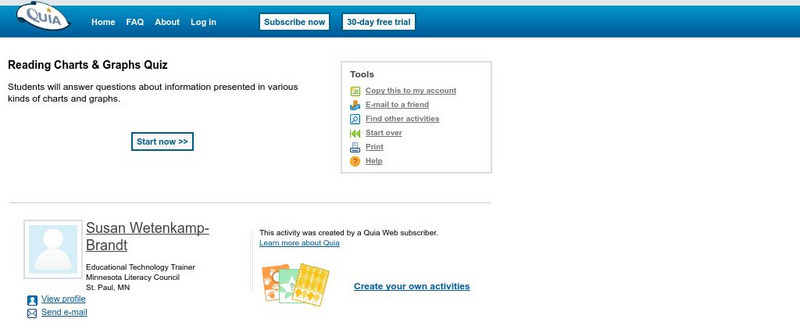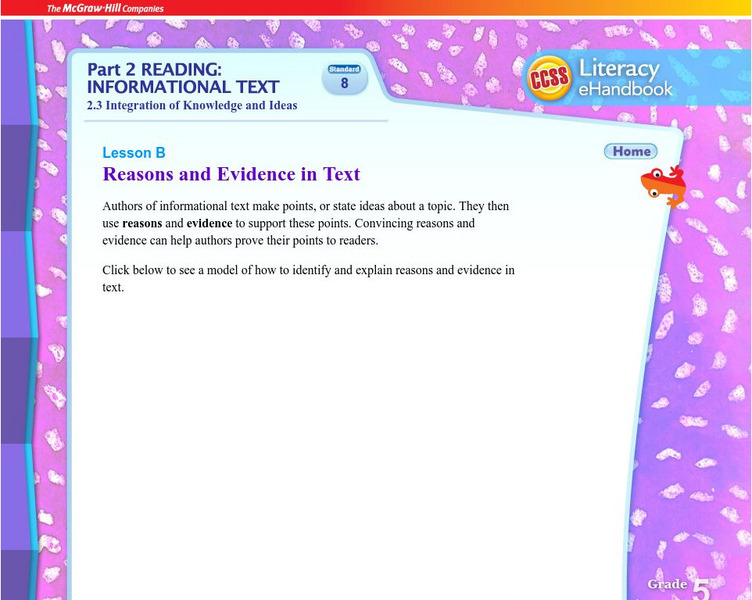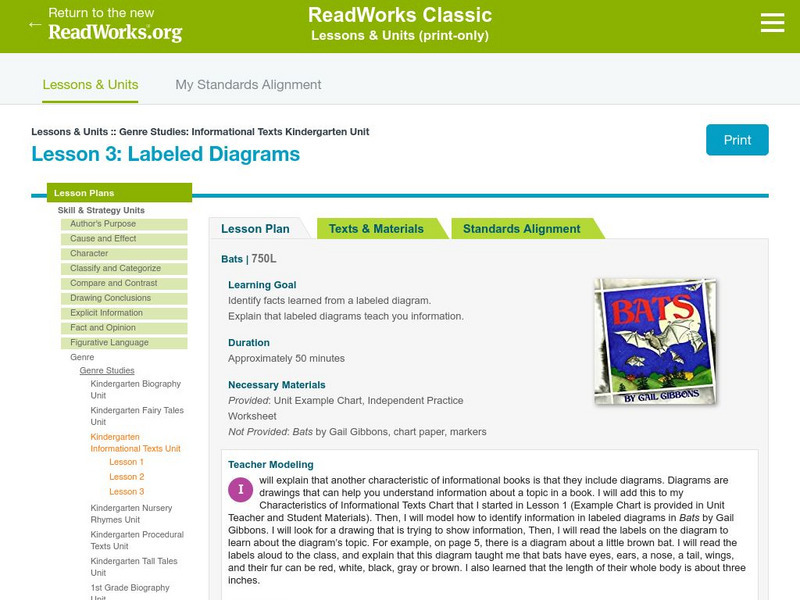Curated OER
Mc Graw Hill: Part 2 Reading: Informational Text: Connections Within Text
Learn how information in a text can be connected through compare and contrast, cause and effect, and sequence.
Curated OER
Mc Graw Hill: Part 2 Reading: Informational Text: Understand Content Words
A reference page that shows you how to use context clues to figure out the meaning of unknown content words.
Curated OER
Mc Graw Hill: Part 2 Reading: Informational Text: Cause and Effect Text Structure
Cause and Effect is a text organization structure and knowing this structure can help you in comprehending a text. Learn about these strategies on this site.
Curated OER
Mc Graw Hill: Part 2 Reading: Informational Text: Understand Content Words
Understand how to use content words and context clues to identify unknown words in a reading passage.
Polk Brothers Foundation Center for Urban Education at DePaul University
Depaul University: Center for Urban Education: Illustrate a Text [Pdf]
This module includes links to pages that can be used to illustrate a text. Links to an illustration planner, picture meaning, and show vs. tell resources are included.
Polk Brothers Foundation Center for Urban Education at DePaul University
Depaul University: Center for Urban Education: Take Show and Tell [Pdf]
Students will use this graphic organizer to show their understanding of what they have read. Afterward, students will share the illustrations with their peers and explain how their pictures connect to the text.
Curated OER
Mc Graw Hill: Part 2 Reading: Informational Text: Show Understanding of Text
This quick activity includes a passage from an information text, and explains reading comprehension strategies to use to answer questions.
Other
Interacting Texts Directed Activities Related to Texts (Darts)
Want to improve your students' reading skills? This is a good place to find the types of directed activities, using a definition text, reconstruction/analysis activities, and advantages of using DARTs.
ReadWriteThink
Read Write Think: I Chart
A printable inquiry chart designed to help students ask questions and collect information from various texts when conducting research on any topic. Directions on how to use this type of graphic organizer as well as lists of teaching...
ReadWriteThink
Read Write Think: K W L S Chart
A printable K-W-L-S sheet to help students activate prior knowledge, ask questions, record new learning, and then ask additional questions to extend inquiry beyond the text . Directions on how to use this type of graphic organize as well...
ReadWriteThink
Read Write Think: Making Connections
A printable graphic organizer for students to use when making text to self, text, and world connections while reading a text. Directions on how to use this type of graphic organize as well as lists of teaching ideas and related resources...
ReadWriteThink
Read Write Think: T Chart
A printable T-chart for students to use when comparing two topics or two sides of one topic. Directions on how to use this graphic organizer as well as lists of teaching ideas and related resources are also provided.
ReadWriteThink
Read Write Think: Using Narrative for Expository Text
Lesson in which students read various narrative texts which provide a context for them to learn content-area topics. Narratives allow the students to begin to understand expository texts.
ReadWriteThink
Read Write Think: Guided Comprehension: Making Connections
Lesson introduces students to the strategy of making connections. Students learn the three types of connections using a double-entry journal. A good resource for teachers.
ReadWriteThink
Read Write Think: Exploring How Section Headings Support Understanding
Teaching students to pay attention to headings and titles as they read? Here you'll find a practical application for using an expository text to apply the concept of using headings. Geared toward older elementary students, but lesson...
ReadWriteThink
Read Write Think: Writing Abc Books to Enhance Reading Comprehension
Contains plans for four lessons that are adaptable to many texts that learners may be reading. Students analyze the text for literary elements such as characters, setting, figures of speech, and themes, and then publish their findings in...
Quia
Quia: Reading Charts and Graphs Quiz
This 25-question quiz asks students to read various kinds of charts and graphs and to select the correct answers to the questions. Immediate feedback is provided after each question. Java is required.
Curated OER
Mc Graw Hill: Part 2 Reading: Informational Text: Reasons and Evidence in Text
Reasons and evidence are given by the author to support topics or ideas. In this resource, learn about finding reasons and evidence in a text. Includes downloadable worksheet.
Read Works
Read Works: Genre Studies: Informational Texts: Pictures and Photographs
[Free Registration/Login Required] Lesson uses All About Cats and Kittens by Emily Neye to teach students how to identify facts from photographs and pictures in informational text. Ideas for direct teaching, guided practice, and...
Curated OER
Mc Graw Hill: Part 2 Reading: Comparison and Contrast Text Structure
A reference article showing reading strategies to understand text structure of comparison and contrast.
TES Global
Blendspace: Cause and Effect
This eleven-part Blendspace is designed to be used while teaching students how to analyze cause and effect. Links include reference sheets, a SMART Notebook Lesson, posters, practice worksheets, and guided practice opportunities.
Tom Richey
Slide Share: Making Connections
A slide show with thirty-two slides explaining how to use text to self, text to text, and text to world connections to improve reading comprehension.
Utah Education Network
Uen: Lesson Plan: Clouds, Rain, and Fog: A Closer Look
A lesson where students use the book Cloud, Rain, and Fog by Fred and Jeane Biddulph to learn about text structures and reading strategies with information texts.
Read Works
Read Works: Genre Studies: Informational Text Kindergarten Unit: Labeled Diagrams
[Free Registration/Login Required] Lesson uses Bats by Gail Gibbons to teach students how to identify facts learned from labeled diagrams within an informational text. Ideas for direct teaching, guided practice, and independent practice...






![Depaul University: Center for Urban Education: Illustrate a Text [Pdf] Unit Plan Depaul University: Center for Urban Education: Illustrate a Text [Pdf] Unit Plan](https://content.lessonplanet.com/knovation/original/78082-d640d8eacd08249b4e95371fd0841ddc.jpg?1661787071)















